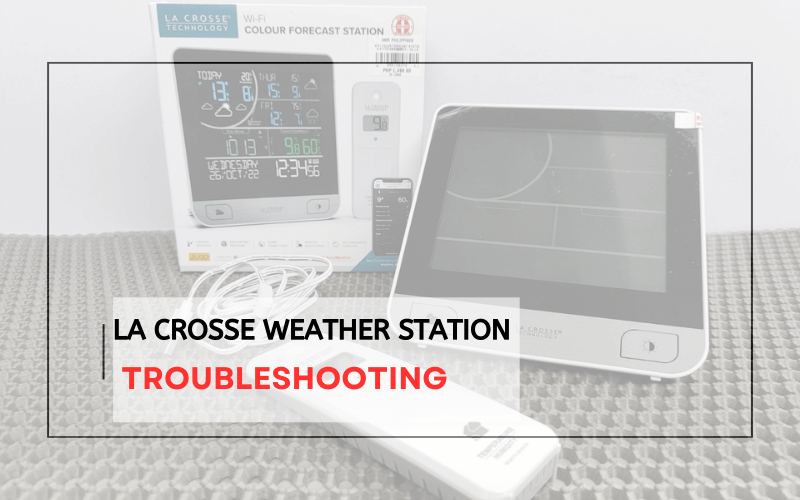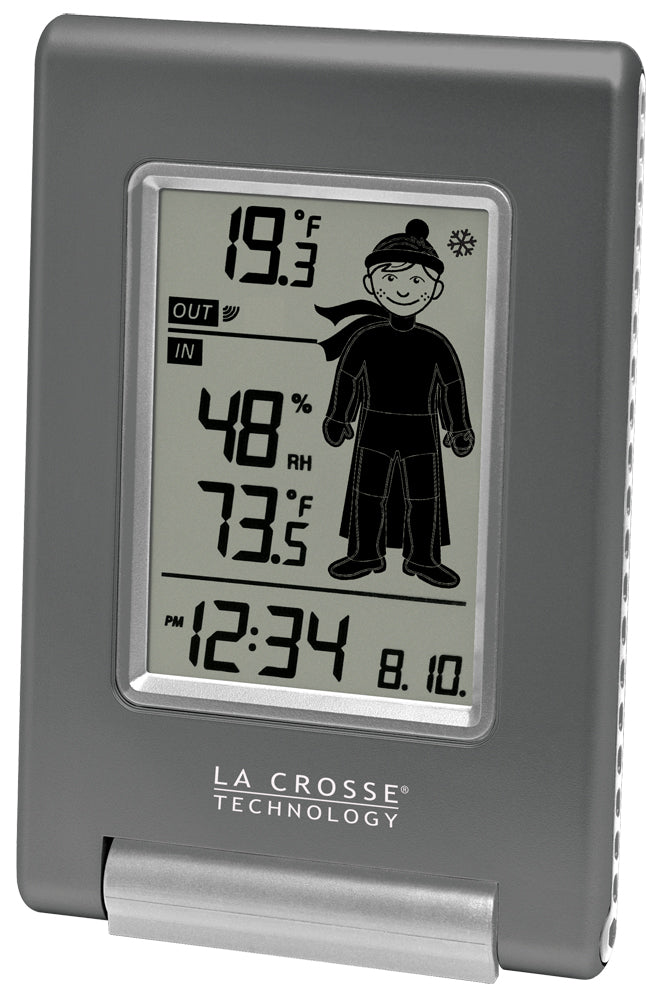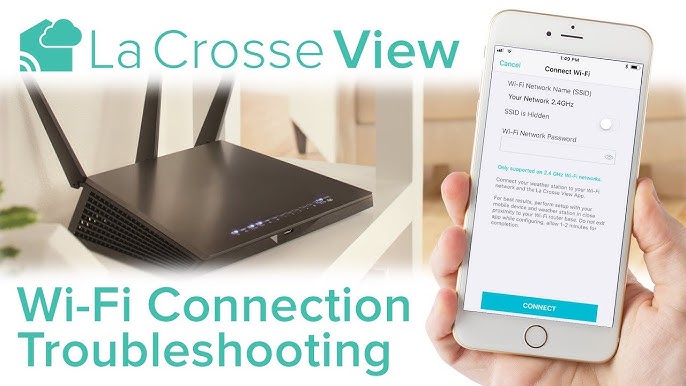Check the batteries and ensure the weather station is within range of the sensor. Reset the device if needed.
La Crosse weather stations are reliable tools for monitoring weather conditions. Sometimes, these devices may encounter issues that require troubleshooting. Common problems include inaccurate readings, signal loss, or display errors. Understanding how to address these issues can restore your weather station to optimal performance.
Simple solutions often involve checking battery life, ensuring proper placement, or performing a reset. Regular maintenance can prevent many common problems. This guide will help you troubleshoot effectively, ensuring your weather station provides accurate and reliable data. By following these steps, you can maintain your La Crosse weather station’s functionality and enjoy its benefits for years.

Common Issues
La Crosse Weather Stations are reliable, but sometimes face common issues. These issues can affect the accuracy of the data. Below, we cover the most frequent problems and how to fix them.
Sensor Malfunction
Sensor malfunction is a frequent issue. The sensor might stop sending data to the display. This problem can occur due to several reasons. Check the following:
- Battery: Ensure the sensor has fresh batteries.
- Placement: Place the sensor in a location with minimal obstructions.
- Interference: Keep the sensor away from electronic devices that cause interference.
If the sensor still doesn’t work, try resetting it. Remove the batteries and wait for a minute. Insert the batteries again and check if it resumes working.
Display Problems
Display problems can also disrupt your weather station’s function. The display might show incorrect data or fail to update. Here’s how to troubleshoot:
- Check the power source. Ensure the display has power.
- Verify the signal strength. Weak signals can lead to display issues.
- Reset the display by unplugging it for a minute. Plug it back in.
If the problem persists, consider recalibrating the display. Follow the manufacturer’s instructions for calibration. This can often resolve display issues.
| Issue | Solution |
|---|---|
| Sensor Malfunction | Check batteries, placement, and interference |
| Display Problems | Check power, signal strength, and reset the display |
Troubleshooting these common issues can help maintain your weather station’s accuracy. Regular checks ensure it continues providing reliable data.
Battery Solutions
Having issues with your La Crosse weather station? Battery problems can often be the culprit. Proper installation and using the right batteries can make a big difference. Follow these solutions to get your station up and running smoothly.
Proper Installation
Installing batteries correctly is crucial. Follow these steps:
- Open the battery compartment carefully.
- Match the positive and negative ends with the markings.
- Ensure the batteries fit snugly in their slots.
If the batteries are loose, the connection won’t be stable. This can cause intermittent power issues. Always double-check the alignment.
Choosing The Right Batteries
Not all batteries are the same. Use high-quality batteries for your weather station.
| Battery Type | Pros | Cons |
|---|---|---|
| Alkaline |
|
|
| Lithium |
|
|
For best results, use lithium batteries in cold climates. They perform better and last longer. In moderate conditions, high-quality alkaline batteries are sufficient.
Signal Interference
Signal interference can disrupt the performance of your La Crosse Weather Station. Identifying and mitigating interference ensures accurate weather data collection. Signal interference can arise from various sources, affecting the device’s functionality.
Identifying Interference Sources
Identifying interference is crucial for maintaining your weather station’s accuracy. Common sources include:
- Electronic Devices: Devices like microwaves and cordless phones.
- Metal Objects: Large metal objects can block signals.
- Wi-Fi Routers: Wireless routers emit signals that can interfere.
- Power Lines: High-voltage power lines can cause signal disruption.
Check each of these potential sources near your weather station. Relocate or shield these sources to reduce their impact.
Improving Signal Strength
Improving signal strength enhances your weather station’s performance. Follow these steps:
- Optimal Placement: Place the weather station in an open area.
- Avoid Obstacles: Keep the station away from thick walls and large objects.
- Elevate the Station: Position it higher for better signal reception.
- Use Signal Boosters: Install signal boosters if necessary.
Here’s a quick reference table:
| Action | Details |
|---|---|
| Relocate Devices | Move interfering devices away from the weather station. |
| Shield Interference | Use materials to block interfering signals. |
| Check Power Supply | Ensure the station has a stable power source. |
By following these steps, you can significantly reduce signal interference. Your La Crosse Weather Station will perform optimally, providing accurate data.

Credit: www.lacrossetechnology.com
Calibration Tips
Proper calibration ensures your La Crosse Weather Station provides accurate data. Calibration involves adjusting your weather station to match known standards. Let’s explore some key calibration tips for your weather station.
Temperature Calibration
Temperature readings can be affected by various factors. To calibrate the temperature sensor, follow these steps:
- Place your weather station sensor next to a reliable thermometer.
- Record the temperature from both devices.
- Adjust the weather station settings to match the reliable thermometer.
This ensures your weather station’s temperature readings are accurate.
Humidity Calibration
Humidity calibration is crucial for accurate weather readings. Here’s how to do it:
- Place your weather station in a sealed bag with a damp cloth.
- Wait for one hour to allow the humidity to stabilize.
- Check the humidity reading on your weather station.
- Adjust the humidity settings to match the expected 100% humidity.
Repeat these steps periodically to ensure ongoing accuracy.
Firmware Updates
Keeping your La Crosse Weather Station up-to-date is crucial. Firmware updates can fix bugs, enhance performance, and add new features. Here’s how to keep your device running smoothly.
Checking For Updates
First, ensure your weather station is connected to the internet. This is essential for downloading updates.
- Open the La Crosse View app on your smartphone.
- Navigate to the settings menu.
- Select your weather station from the list.
- Check for available firmware updates. If an update is available, the app will notify you.
If no update is available, the app will show your firmware is up-to-date.
Installing Updates
Once you’ve confirmed an update is available, follow these steps to install it:
- Ensure your weather station is powered on and connected to Wi-Fi.
- In the La Crosse View app, select the firmware update option.
- Follow the on-screen instructions to start the update.
- Wait for the process to complete. Do not disconnect the device.
After the update completes, your weather station will restart. You can then resume normal use.
Tips For A Successful Update
Here are some tips to ensure a smooth update process:
| Tip | Description |
|---|---|
| Stable Connection | Ensure a strong and stable Wi-Fi connection during the update. |
| Full Battery | Make sure your weather station has a full battery or is plugged in. |
| Patience | Do not interrupt the update process. Let it complete fully. |
By following these steps, you’ll keep your La Crosse Weather Station performing at its best.

Credit: m.youtube.com
Placement Advice
Proper placement of your La Crosse weather station ensures accurate readings. Here, we provide essential placement advice for both indoor and outdoor setups.
Indoor Placement
Find a location inside your home that is free from direct sunlight. Place the sensor away from heat sources like radiators or stoves. Ensure the spot has good airflow to measure the room’s temperature correctly.
- Avoid direct sunlight: Sunlight can affect temperature readings.
- Avoid heat sources: Keep away from radiators and stoves.
- Ensure good airflow: Place in an area with adequate ventilation.
Outdoor Placement
Position the outdoor sensor in a shaded area. Avoid placing it near metal objects which can interfere with signals. Ensure the sensor is mounted at least 5 feet above ground.
- Shaded area: Direct sunlight can skew temperature readings.
- Away from metal objects: Metal can affect signal strength.
- Above ground: Mount the sensor at least 5 feet high.
| Placement Area | Advice |
|---|---|
| Indoor | Avoid heat sources, ensure good airflow. |
| Outdoor | Shaded area, away from metal objects. |
Maintenance Routine
Maintaining your La Crosse weather station is crucial for accurate readings. A regular maintenance routine ensures longevity and reliability. Follow these steps to keep your weather station in top shape.
Cleaning Sensors
Regular cleaning of sensors is essential. Dust and debris can affect accuracy.
- Use a soft brush to remove loose dirt.
- Wipe with a damp cloth for stubborn grime.
- Ensure sensors are completely dry before reassembling.
Regular Inspections
Inspect your weather station monthly. Look for signs of wear or damage.
- Check battery levels and replace if necessary.
- Inspect solar panels for dust and clean them.
- Ensure all parts are securely attached.
Following a consistent maintenance routine can prevent common issues. Keep your La Crosse weather station accurate and reliable.
Expert Resources
Finding the right resources for troubleshooting your La Crosse Weather Station can be essential. Expert help can save time and frustration. Below are some valuable resources to assist you.
Online Forums
Online forums are excellent for troubleshooting La Crosse Weather Station issues. Many users share their experiences and solutions. You can find step-by-step guides and tips.
- Weather Station Forums: These forums focus on various weather stations, including La Crosse.
- Reddit Communities: Subreddits like r/weather and r/WeatherStations offer advice.
- DIY Forums: DIY electronics forums can provide technical help.
Forums offer real-world solutions from people who own La Crosse Weather Stations.
Manufacturer Support
Manufacturer support is vital for accurate troubleshooting. La Crosse Technology offers dedicated support.
| Resource | Details |
|---|---|
| Official Website | Visit the La Crosse Technology website for manuals and FAQs. |
| Customer Service | Contact their support team via phone or email. |
| Live Chat | Use their live chat for instant help. |
Manufacturer support often provides the most reliable information. They have detailed knowledge of their products.
Frequently Asked Questions
Why Is My La Crosse Weather Station Not Updating?
Ensure the sensor batteries are fresh and properly installed. Verify the sensor and display unit are within the recommended range. Check for any obstructions.
How Do I Reset My La Crosse Weather Station?
Remove the batteries from the sensor and display unit. Wait for 15 minutes. Reinsert the batteries and re-sync the units.
What Does “ll” Mean On My La Crosse Weather Station?
“LL” indicates a low battery in the sensor. Replace the sensor batteries with new ones to resolve the issue.
How To Fix La Crosse Weather Station Signal Loss?
Ensure there are no electronic devices causing interference. Reposition the sensor and display unit for better signal reception.
Conclusion
Troubleshooting your La Crosse weather station can seem daunting, but these tips make it manageable. Regular maintenance and timely updates ensure optimal performance. Use this guide to tackle common issues and enjoy accurate weather data. Keep your weather station in top shape for reliable information every day.
